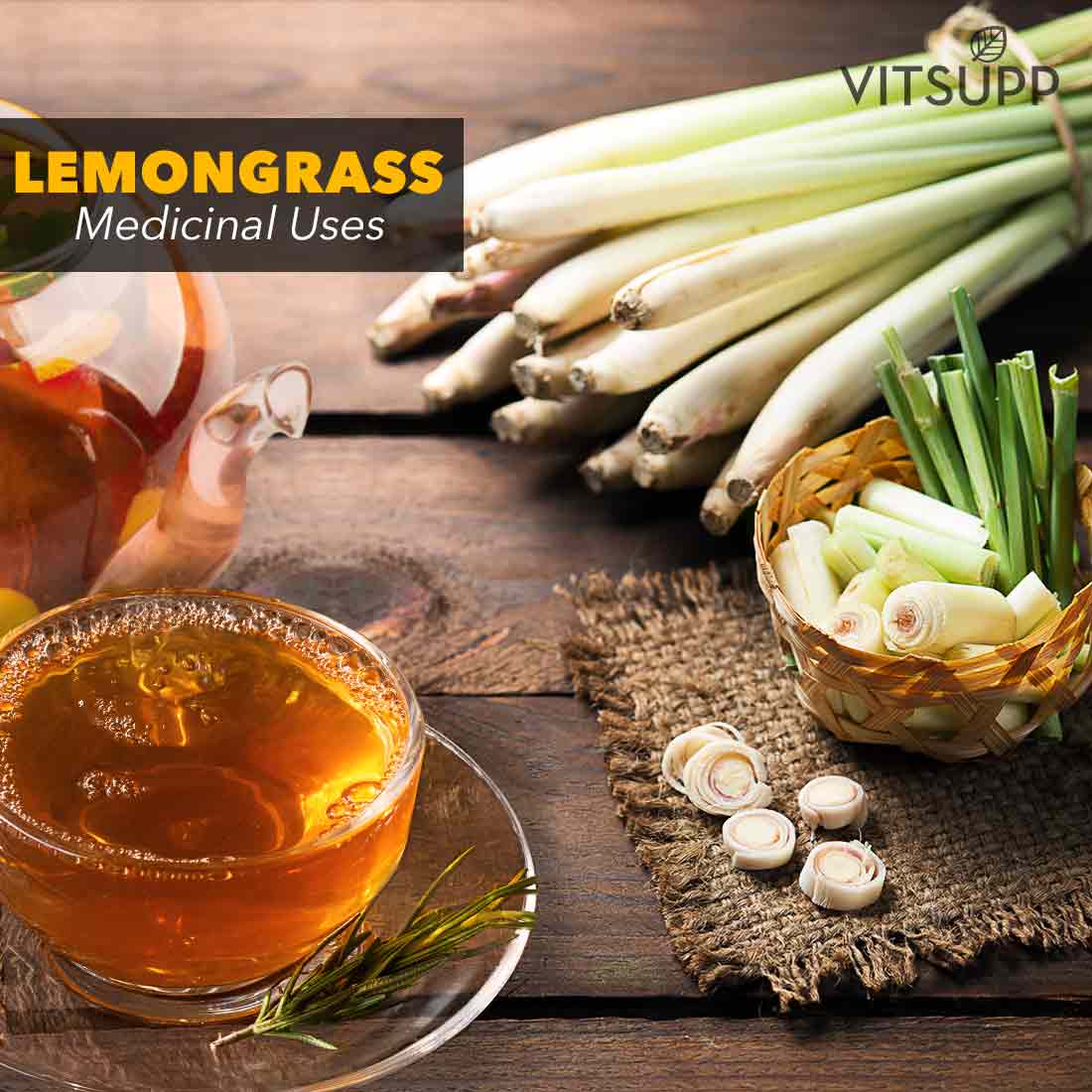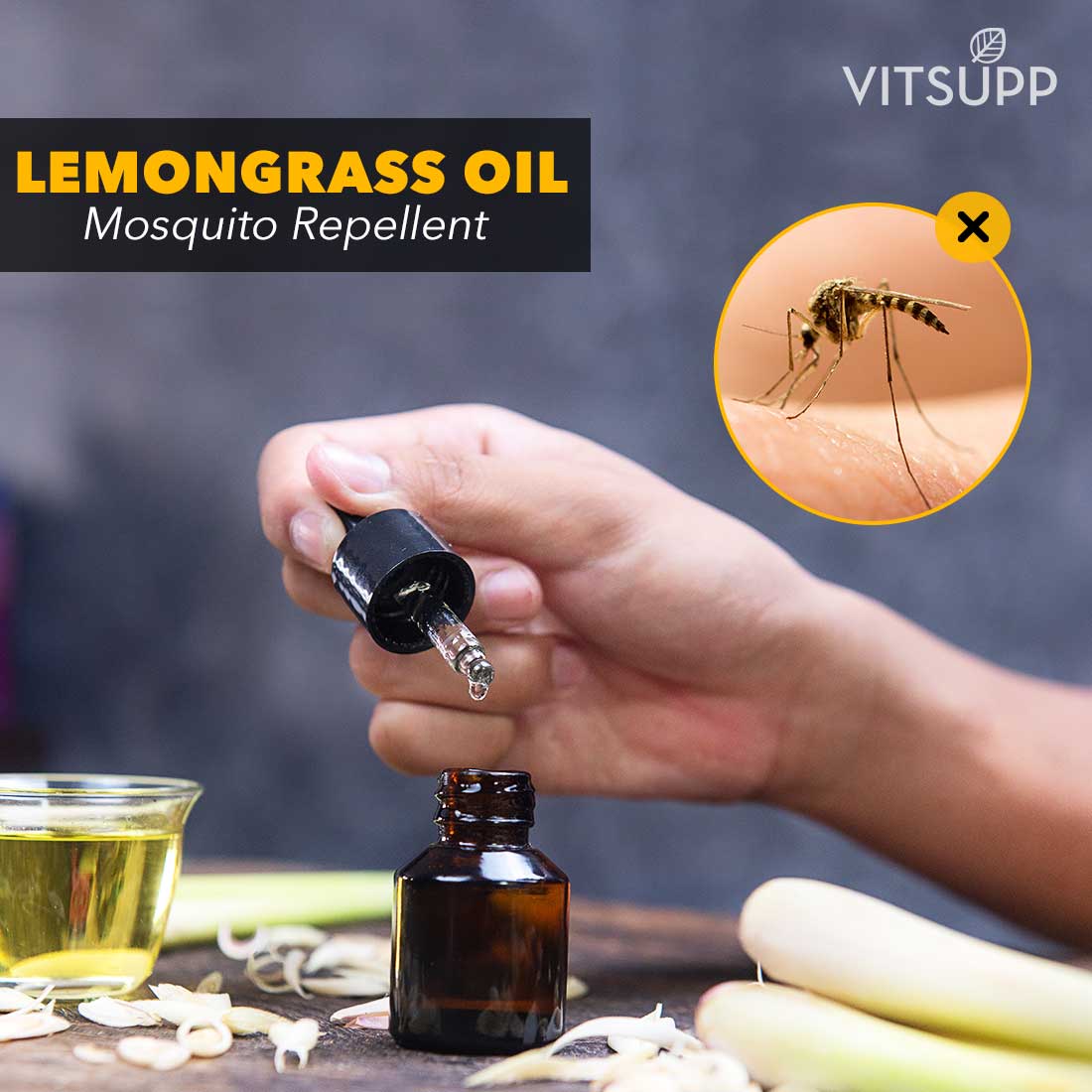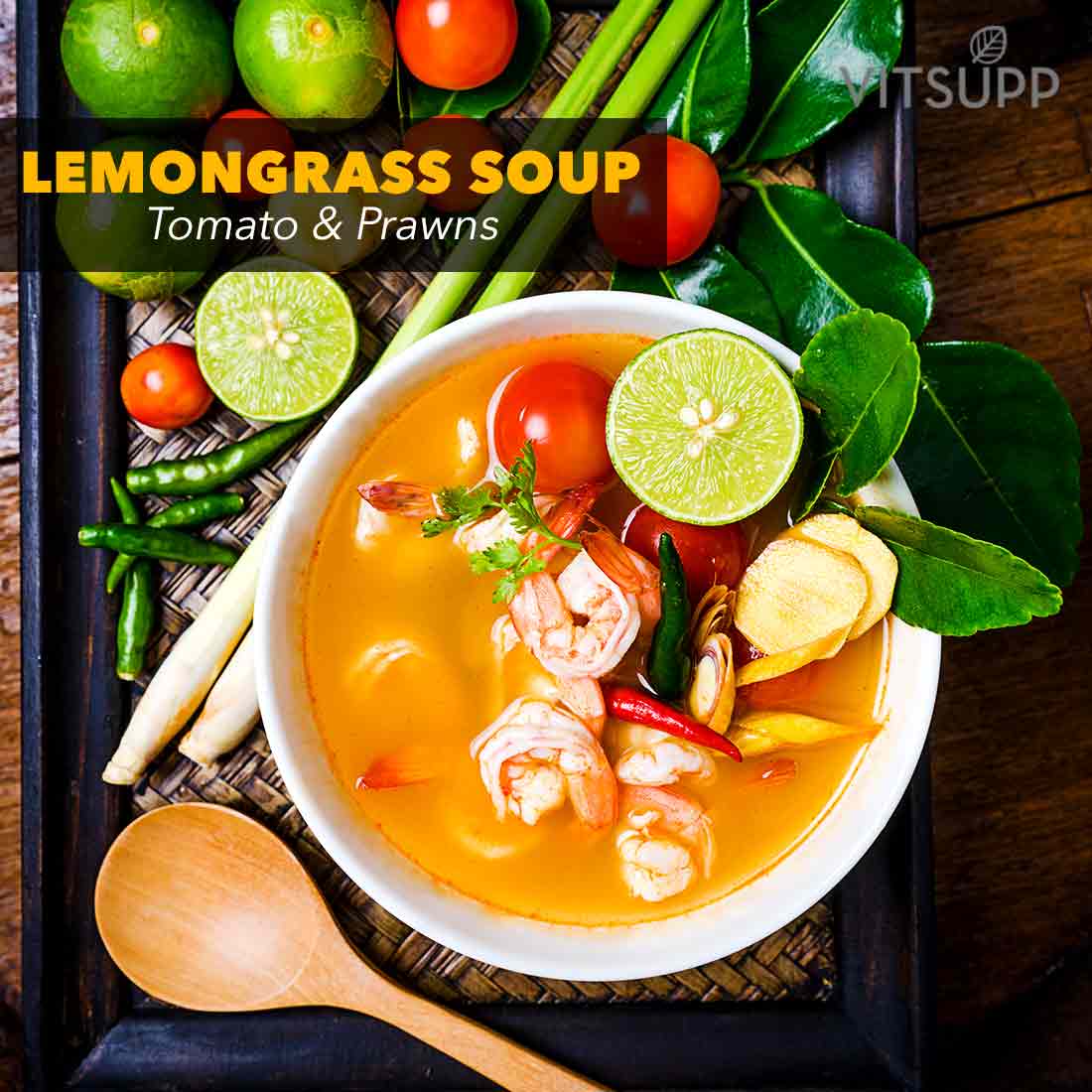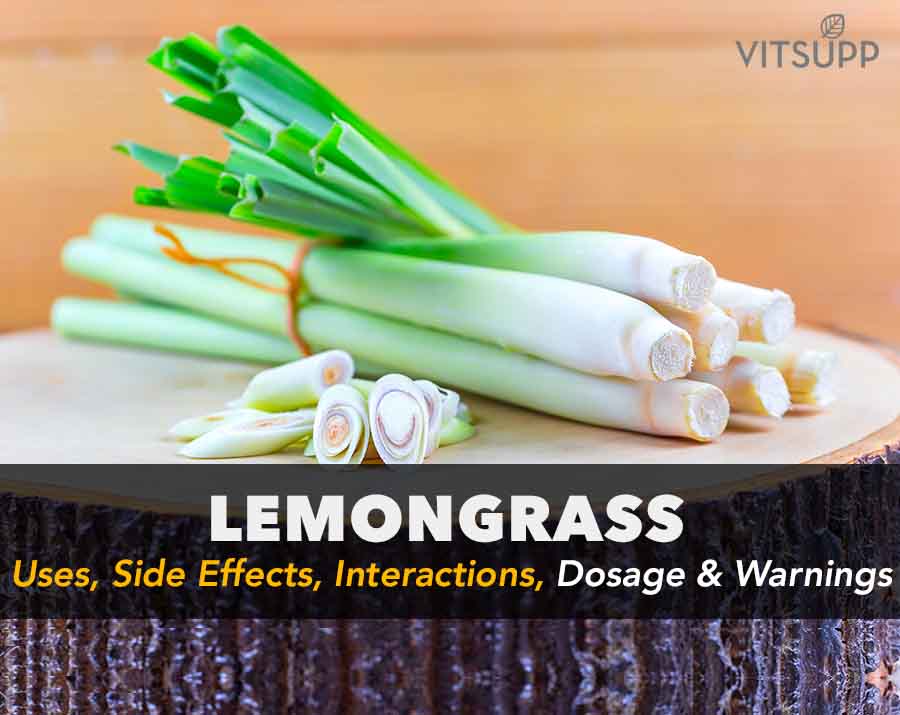Can you imagine your favourite Thai dish without that sweet lemongrass smell? Of course not. Lemongrass is to Thai cuisine what cheese is to pizza. And, there is much more to the humble lemongrass than making your favourite Thai green curry lip-smackingly good.
Lemongrass is used in a lot of Thai and Vietnamese cooking. Its sweet, lemony flavour adds more life to dishes, making it a hot favourite, but did you know that this particular type of grass has several medicinal, therapeutic, and cosmetic benefits as well? In this article, you will learn all the benefits, side effects, and precautionary measures, if any.
Contents
What is lemongrass?
Lemongrass, essentially, as the name suggests, is a type of grass that has a lemon-like flavour and smell to it. It happens to be a tropical grass, with long grass-like leaves and a more solid portion below the ground.
It usually grows in clusters or bunches, and are found mostly in tropical or subtropical climatic regions. Lemongrass is easily found in countries like Brazil, India, Sri Lanka, Central Africa, the USA, and Southeast Asia.
It is most commonly used in cooking as mentioned above, but did you know that this wonderful plant is also used in cocktails? There’s more…it is used in various sodas and desserts as well. In some places, it is also used as an insect repellant.
Lemongrass is also known as Cochin grass, Malabar grass, oil heads, barbed wire grass, or Cymbopogon.
There are many varieties of lemongrass, however, the two most commonly found and used varieties are as follows-
1. Cymbopogon citratus
This type of lemongrass is found mostly in southeast Asia. it is used for largely in the cuisine and for culinary purposes. It is also used as a medicinal herb and for its fragrance in cooking.
2. Cymbopogon flexuosus
Cymbopogon flexuosus is used mainly in countries like Thailand, India, Sri Lanka, Burma, Laos, and Cambodia, again, for culinary purposes as well as for its medicinal benefits.
Benefits of Lemongrass
Lemongrass, as mentioned before, is chock full of benefits. Listed below are a few benefits of lemongrass, that you should be aware of –
1. Relieving anxiety
It has a calming effect on your mind. One of the side effects of you being stressed and anxious is high blood pressure. The use of lemongrass, in the form of aromatherapy or even through the consumption of its tea, has shown promising results that eases the effects of anxiety and stress.
In a study conducted in 2015, it was seen that lemongrass oil that was used regularly during massage therapy, resulted in the lowering of blood pressure.[1]
2. Lowering cholesterol
Both lemongrass oil, as well as lemongrass tea, have shown to be beneficial in managing and regulating the levels of cholesterol in the body. There is a common misconception that cholesterol is bad for your body, but that’s not true. Cholesterol by itself is not harmful to your body. In fact, it is responsible for the development of cells and hormones.
However, when the level of cholesterol in your body rises, then that’s when the problems begin. It paves the way for life-threatening issues like heart diseases and stroke. It can significantly lowers the amount of cholesterol in the body, thereby preventing heart ailments and strokes. [2]
3. Preventing infection
It has superior antibacterial qualities. This means that it comes in handy in the treatment of infections. For years, lemongrass oil has been used as a natural remedy to heal wounds and treat infections. Lemongrass oil has been beneficial in treating pneumonia, blood infections, intestinal infections, and various skin diseases as well. [3]
4. Weight Loss
It also happens to be a great choice if you are planning to embark on a weight-loss mission. In case you haven’t heard already, lemongrass tea is one of the best detox drinks available. It helps kick-start and boosts your metabolism, which in turn helps you drop some pounds.
It also happens to be a natural diuretic, which means that it makes you pass urine more often than normal, thereby cleansing your system as a detoxification process. You could consider replacing a few of your health drinks with water laced with lemongrass or lemongrass tea.
This is a great alternative to unsweetened drinks as well. Its oil also contains citral, which incidentally constitutes about 80% of the main components. Now citral can help reduce the accumulation of lipids or fats. It can also increase the dissipation of energy. Both, the dissipation of energy and the lowering of lipid accumulation is great for weight loss. [4]
5. May help in gastrointestinal disorders
It is great for digestion. In fact, drinking lemongrass tea in case you are suffering from an upset stomach is a great home remedy for digestive issues. People who constantly suffer from gastric ulcers should consider consuming lemongrass tea as well. This is because it can help protect the lining inside the stomach.
Also, if you find yourself consuming aspirin and ethanol regularly, then chances are that you are suffering from ulcers. Make sure you consume lemongrass to deal with this issue. [5]
6. Increasing red blood cell count in anaemia
Could lemongrass help increase your blood count and reverse the effects if anaemia? Well, according to a study conducted by a group of researchers from two universities of Uyo and Calabar, lemongrass has the potential to treat anaemia.
Participants in this study were made to consume water infused with extracts of lemongrass on a daily basis. After this, an increase in the percentage of red blood cells, as well as the packed cell volume and haemoglobin levels were observed. [6]
7. Anticancer Potential
As mentioned above, a major constituent of lemongrass is citral, which makes for up to 80% of its composition. The citral in lemongrass is capable of driving cancer cells to commit suicide and self destruct. And the best part is, it leaves the healthy cells unharmed. Additionally, It also boosts your immune system, which in turn helps fight and manage cancer. [7]
8. Relieves edema & bloating
Edema is a condition which includes the abnormal accumulation of fluids in the body, which causes puffiness or bloating. Most of the time, the fluid is accumulated under the skin, but it can get retained in the lungs as well.
It can be largely beneficial in treating bloating that is caused due to edema as well as the overall treatment of edema in itself. It has anti-inflammatory properties so it provides relief from bloating. Since it is a diuretic, it also helps relieve the accumulation of fluid in the body. [8]
9. Has anti-inflammatory, anti-fungal, and anti-bacterial properties
Since lemongrass has great anti-inflammatory, anti-fungal, and anti-bacterial properties, it is safe to say that it works wonders for your skin as well. It can help keep invaders like germs, bacteria, and infections at bay, and help in maintaining clear skin.
It also has antioxidant properties, which means it can help maintain a balance of the free radicals in your body. Thanks to its astringent qualities, it can help maintain the constriction of blood vessels as well. Including lemongrass as a part of your skincare regime, for maximum benefits.
10. For good oral health
Lemongrass tea is used to treat cavities and oral infections. Its antimicrobial properties are effective against Streptococcus mutans, the bacteria that causes tooth decay. It has also helped treat athlete’s feet, ringworms, urinary tract infections, and scabies.

Lemongrass medicinal uses
- It contains a compound known as citral, that can help relieve pain in joints and muscles. Therefore, it is often used as a massage oil.
- It contains antimicrobial saponins and vitamin C, both of which helps treat cold and flu
- The citrus-like flavour of lemongrass greatly relieves sore throat and cough
- Lemongrass oil used to treat various skin infections, thanks to its antimicrobial and antifungal properties. It can also help prevent acne and pimples.
- It has antiseptic properties as well. Therefore, it is applied to affected areas also because it has a soothing quality.
- Because it can promote digestion of food in your body and helps with gas and bloating, lemongrass has great medicinal value in treating gastrointestinal issues as well.
- Relieves pain caused due to rheumatism and other nerve conditions
- Used in aromatherapy for rejuvenation and revival of both the mind and body. This is largely due to its calm and soothing attribute. (9)

Lemongrass & mosquitoes
The list of benefits of lemongrass only seems to be growing. Did you know that It can be used, and is pretty effective in warding off mosquitoes? We all know how irritating mosquito bites can be. And that is not all, these creatures can be carriers of various diseases like malaria and dengue.
It is also used as an insect repellent to keep away lice, fleas, and ticks as well.(10)

Lemongrass hair benefits
If your hair needs some tender loving care, then try opting for lemongrass oil as a home remedy. This wonder herb has anti-fungal and antimicrobial properties that can keep scalp infections like dandruff and psoriasis at bay.
It can also keep your hair smooth and shiny by strengthening the hair follicles and promoting the growth of hair. Lemongrass oil is also a great choice because of its lovely lemony fragrance. Lemongrass oil mixed with olive or coconut oil can help prevent and treat hair loss as well.
How to grow lemongrass
It happens to be the kind of plant that grows easily, without the need for constant care and attention. Since it is a tropical plant, it grows best in tropical and subtropical regions. In fact, you can spot this herb easily across several countries all around the world, even though it is native to most parts of India, Sri Lanka, and Asia.
If you’re planning to grow lemongrass yourself at home, then there are two ways to do so. One is with the lemongrass seeds, and the other is with the lemongrass stalks. Let’s see how this can be done:
1. Growing lemongrass with lemongrass seeds
Lemongrass seeds are small and fine. They are available at local plant nurseries at a reasonable rate. You can buy lemongrass seeds online as well.
The first step is to germinate the seeds. The germination process takes place quite fast as far as lemongrass is concerned.
For the process of germination, take flat pieces of cotton and with some water, make the cotton swabs moist. Place the seeds in the bed of moist cotton. Soon, you will see that the seeds have germinated. This means it is time to plant the seeds in a potted plant or on a patch in your garden.
After transferring thee germinated plant to a pot, keep it in an area that receives ample sunlight.
2. Growing lemongrass with lemongrass stalks
You can grow it directly from the stalks as well. When buying lemongrass stalks from your local grocery store or supermarket, look for stalks that are fresh and firm. Gently trim the top half of the plant. Look for dry or brown areas so you can trim this as well. Find a suitable bowl and fill it with water. Gently plant the plant in this. You need to make sure that the plant receives enough sunlight. After a few days, you will notice the growth of roots. Once the roots are strong, you can transfer and replant this in a pot or in your backyard.
How to use lemongrass
Now that we know the benefits of lemongrass, let’s look at how we can use it –
-
Lemongrass tea
One of the most common ways of consuming it in the form of tea. This is popular in Latin American and African cultures. Thanks to its lemon-like flavour, lemongrass herbal tea tastes great. Some people also consume lemongrass-infused water. It has various benefits, including a calming, soothing effect on the mind.
-
Lemongrass oil
It is used for its fragrance, and a soothing oil in massages, and in aromatherapy for its calming properties. Lemongrass essential oils are also used as bath oils during spa treatments, as it helps with blood circulation as well. [11]
-
Lemongrass in cooking
Its lower part is used for culinary purposes, particularly lemongrass stalks. The mild citrus-like flavour makes it great for garnishing. Bartenders also use fresh lemongrass in a few cocktails. [12]
-
Lemongrass fragrance diffuser
A house that smells great is relaxing and inviting, and there is no denying that lemongrass smells great. You can make your own natural room freshener with lemongrass. All you need is a spray bottle or diffuser, lemongrass essential oil, water, and a natural emulsifying agent.
As you know, water and oil don’t mix, so by adding an emulsifier like honey, alcohol, salt, or witch hazel. First, add a few drops of lemongrass essential oil to the spray bottle. To this, add an emulsifier like salt. Mix it gently. Then, fill the bottle with water and shake it gently so all the ingredients form a homogeneous mix. Your lemongrass room freshener is all set! (13)
-
Lemongrass Powder
If you can’t find lemongrass leaves, you can get lemongrass powder as well. This is available online or at supermarkets. (14)
Lemongrass extract for cooking
The easiest way to do so is boil lemongrass stalks in water, and use that in your favorite recipe. Otherwise, you can take a few stalks, tie them together and place it directly with the rest of the ingredients when cooking. This will infuse your dish with that appetizing lemongrass smell and make your food more flavorful.

Lemongrass Recipes
Here are a few recipes that you can try out at home using lemongrass –

-
Lemongrass infused tea with ginger and mint leaves
This happens to be one of the most common recipes of lemongrass. To prepare this, fill a vessel with a cup of water. Add a few stalks of lemongrass leaves, mint leaves, and a small slice of ginger, and bring it to a boil. Once this has boiled, strain the tea into a cup. Add a preferred sweetener of your choice, like honey, jaggery, or sugar.

-
Lemongrass soup
Lemongrass soup is a common Thai speciality that is extremely delicious. Wellness experts recommend it if you are suffering from a cold of flu.
To make this, boil a few stalks of lemongrass in two cups of water. Make sure you boil this for at least five minutes so that the flavour from the lemongrass comes out. Strain out the lemongrass. To this, add vegetables of your choice, like carrots, baby corn, and broccoli. Add crushed pepper, salt, and some lime juice to the boiled vegetables. Your clear lemongrass soup is ready! (15)
- Lemongrass paste
You can use lemongrass paste to make a variety of dishes like lemongrass chicken or fish. The heavenly lemon tang adds a special twist to spicy dishes. To make lemongrass paste, you need garlic, ginger, curry leaves or kafir leaves, and a few stalks of lemongrass. Finely chop all of these, and make a past of this in a grinder or using a mortar and pestle. (16)
Safety and side effects
Studies suggest that It is a safe herb with no serious side effects. In fact, its antimicrobial, anti-inflammatory, and antioxidant properties make it a great herb with several benefits for your body.
However, there is evidence that shows that it can induce menstrual flow, so pregnant women are advised against the consumption of lemongrass. [17]
Dosage
Several factors like your age, state of health, and previous history of health-related incidents come into play while deciding the appropriate dosage for you. Although it is a naturally occurring herb, too much of anything is bad.
So make sure you consume it in moderation. Consult your physician or a healthcare professional, to be on the safer side. (18)
In Conclusion
It is a herb with many uses, and you can easily grow it in a pot. If nothing, you can use the crushed leaves to make your room or car interior smell great. You can easily use it in your cooking and feel proud of your Thai cooking acumen.
If you want, you can easily make its extract at home- or can buy one from a good brand. But before consuming it, consult a doctor to rule out chances of allergies.


